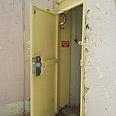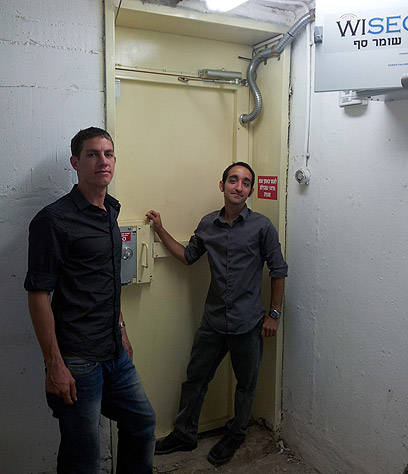
Two students from Beersheba's Ben Gurion University have found a solution that could save lives.
Related stories:
- Escalation in south makes portable shelters all the rage
- 'Contractors bribed engineer to approve faulty shelters'
- Israeli company introduces 'instant' fortified space
Ran Kraus, a 29-year-old management student and Amir Tzaliach a 28-year old materials engineering student recently came up against one of the locked shelters and decided they had had enough.

Ran Kraus and Amir Tzaliach, with 'Doorman' (Photo: Atar Peri)
The result: 'The Doorman' also known as WISEC, an automated system that locks, unlocks and oversees shelters and fortified rooms. The system was developed with the help of the Beeper company.
Should missiles or rockets be fired at Israel, it will first be identified by security forces and then the company's headquarters will receive an alert.
The relevant shelters will then receive a signal, the system receives the signal which will then cause the shelter doors to open. Thus, the city call center also receives notification of the shelter's availability.
Continuous monitoring
"A year and a half ago," noted Kraus, "we were on our way to a shelter in one of Beersheba's older neighborhoods…and we found that the public shelter was locked. We sat together and tried to think of how we could solve the problem."
The two teamed up with Beeper and after 18 months of development, reached the final product – the Doorman. The system they developed enables shelter doors in the threatened area to unlock automatically in less than four seconds.
In addition to the wireless opening and closing of the shelters, in groups or just single units at any given time, it also allows for continuous monitoring and the transference of information on each shelter in real time, it is also combined with a burglary alarm system.
The Beersheba municipality decided to adopt the two young entrepreneurs after the students approached it. "They told us at the municipality that someone had tried to do things like this in the past and it didn't work.
"After three months we came back to them with a working prototype and they were very impressed and helped us through every stage in the product's development, "Kraus stated.
The Beersheba Municipality has already completed a successful trial of the system in laboratory conditions but has yet to complete an on-ground trial of the system.
- Receive Ynetnews updates
directly to your desktop















